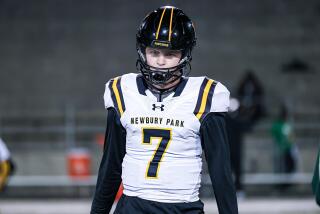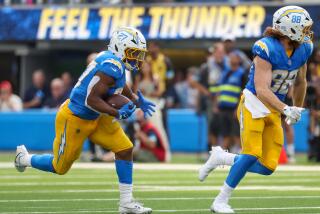O’Hara’s Road to Recovery Isn’t a Snap : Chargers: Ex-USC quarterback, felled by knee surgery, seeks job after World League success.
- Share via
LA JOLLA — Pat O’Hara stood tall on the UC Irvine practice field the other day.
He threw his first pass in a scrimmage with the Rams and watched in frustration, like any quarterback would, as it was intercepted and returned for a touchdown.
He kept throwing, though, and he completed his next seven passes, including a 43-yard touchdown, and altogether it was a fine day of football.
At the conclusion of practice he walked to the buses like the rest of his Charger teammates before being stopped by a sportswriter.
“At first I didn’t know what he was talking about,” O’Hara said. “He said, ‘So you’re walking off the field this time, huh?’
“I hadn’t given it a thought, and then I had this great feeling come over me because I realized I had put all that to rest. It was gone, completely gone.”
Three years ago on this very stretch of grass, trainers had carted O’Hara from the field. His football career was over. Ten days before he was to open the season as USC’s starting quarterback, he went down with a devastating knee injury.
“It was a nightmare,” he said. “Two major knee surgeries a week apart. I lost 35 pounds, I was on morphine, I was sick, I was depressed. It was horrible.”
It was so bad, that for one moment he contemplated suicide. “Yeah,” he said, “you get so depressed and so down, I just really didn’t want to be around.”
One second he was a star in the making, the next he was laying on his back. Pat O’Hara had competed against Todd Marinovich and Marinovich’s super-kid reputation, and he had triumphed to earn starting honors for the Trojans.
“I had worked hard and then this happened to me,” he said. “Why me? Why me? What did I do? Why did it happen to me? I hadn’t done anything wrong.”
Marinovich went on to make headlines at USC and become a starting quarterback for the Raiders. O’Hara finished his college career with nine pass attempts and a pair of scars on his knee.
“A lot of people say, ‘Oh, God if you hadn’t got hurt maybe you could have been this or maybe you could have been that,’ ” O’Hara said. “They say, ‘You could have been a No. 1 pick.’ I can’t look at it that way because it would drive me crazy.
“I really feel I’m a better man because of what I’ve been through and what I had to face in terms of not knowing whether I would ever play football again or walk without a limp. It was a humbling experience, but it has made me stronger.”
O’Hara’s missed opportunity, which even drew a letter of condolence from President Ronald Reagan, is a compelling story, but one which he has no desire to tell any longer.
“People always want to bring up what happened and they want to know about Todd, and I don’t want to hear it because I’m trying to look forward,” O’Hara said. “I have nothing against Todd. He didn’t do anything. Todd is great and he’s a talented guy, and I’m just trying to do my thing.
“Everywhere I go people want to know what Todd’s like because it’s sort of mysterious, his upbringing and the way he is. When I went to Florida for the World League they wanted to know about Todd.
“Hey, all I’m worried about is myself. I’ve been dealt a hand of cards and I’ve got to play them. If I keep thinking about what happened and dwelling on it, it makes me miserable. It’s still very painful to look back.”
The Tampa Bay Buccaneers took a look forward and used a 10th-round pick in the 1991 draft for the potential they witnessed in a 1 1/2-hour O’Hara workout.
“I was going to play football until somebody said I was no good or until I was cut,” he said. “I’d lay in bed at night and I’d say, ‘I know I can play. I know I can play.’ ”
The Bucs, however, released O’Hara at the conclusion of training camp, and after no one claimed him, they re-signed him to their practice squad. The Bucs added him to their 47-man roster later in the season, but he has yet to take a snap in NFL play.
“After last season I agreed to play in the World League for the Ohio Glory, an expansion team. I took a beating, but it was so great to be playing again. It was very important in terms of my confidence and obviously my career. I don’t think I’d last long without some experience.”
When he replaced Babe Laufenberg as the Glory’s No. 1 quarterback in early April, he made his first start since playing at Santa Monica High School. He went on start six games for the Glory, suffered a concussion and a separated shoulder and completed 116 of 201 passes for 1,188 yards with three touchdowns and 11 interceptions.
“Pat is a guy that reminds me very much physically of John Unitas,” Wally English, the former Glory offensive coordinator, told the Columbus Dispatch. “The way he moves his body, the way he throws the ball, the body structure is very similar. I’ve seen two guys who throw the ball the way he throws it: John Unitas and Joe Ferguson.
“He has a very quick release. He gets a lot of velocity on the ball.”
General Manager Bobby Beathard saw the same thing in O’Hara.
“He’s got that natural football awareness, and I don’t know if you can find guys that can get the ball there any quicker,” Beathard said. “It’s a blur. That’s the way Unitas was.”
Beathard had his eye on O’Hara last season, but the Bucs owned his rights.
“He’s a kid that you watch and you just know he has it,” Beathard said. “I felt that way about John Friesz when I saw him at the University of Idaho.
“I kicked myself last year in the draft because I really had plans of drafting O’Hara. I screwed it up, let him slip and Tampa Bay took him. When his name came up on Plan B this year I was shocked. I called him that day and told him we wanted him.”
The Bucs tried to talk O’Hara into staying, but Beathard was more persuasive. Now O’Hara is competing with Bob Gagliano and Jeff Graham to be Friesz’s understudy.
“He got some valuable experience in the World League and I think he looked terrific,” Beathard said. “Now we’ll just see how far he can come when we start playing.”
He has come far already.
“He’s bored and he’s in pain,” O’Hara’s mother, Patricia, said shortly after her son was injured. “Psychologically, he’s getting along better now, but in the middle of the night I can hear him sobbing. He’s crying his dreams away.”
There is good reason once again to dream.
“I hear guys complaining about two-a-day practices and how tired they are,” O’Hara said, “and I’m running around and throwing the ball and I just thank God every day for the opportunity I have.”
More to Read
Fight on! Are you a true Trojans fan?
Get our Times of Troy newsletter for USC insights, news and much more.
You may occasionally receive promotional content from the Los Angeles Times.






